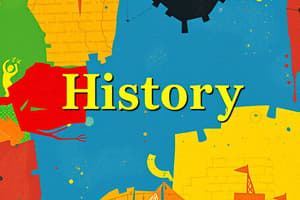Podcast
Questions and Answers
What does the study of political history primarily focus on?
What does the study of political history primarily focus on?
- Economic systems and trade
- Cultural practices and beliefs
- Political events and governmental structures (correct)
- Everyday life and social structures
Which of the following periods is characterized by colonization and industrialization?
Which of the following periods is characterized by colonization and industrialization?
- Modern History (correct)
- Medieval History
- Prehistoric
- Ancient History
What does historiography study?
What does historiography study?
- The chronology of ancient events
- How history has been written and interpreted (correct)
- Only primary sources
- Methods of historical research
Which of the following is an example of a primary source?
Which of the following is an example of a primary source?
The Agricultural Revolution is significant because it marked a transition to what type of society?
The Agricultural Revolution is significant because it marked a transition to what type of society?
Which historian is known for analyzing political and military history?
Which historian is known for analyzing political and military history?
What does source criticism involve?
What does source criticism involve?
What is the main focus of cultural history?
What is the main focus of cultural history?
Flashcards are hidden until you start studying
Study Notes
Definition of History
- Study of past events, particularly in human affairs.
- Involves analysis of sources and narratives to understand context and significance.
Branches of History
- Political History: Focus on political events, leaders, and governmental structures.
- Social History: Examines everyday life, social structures, and relationships.
- Economic History: Studies economic systems, trade, and development.
- Cultural History: Explores cultural practices, beliefs, and art.
- Military History: Covers wars, battles, and military strategies.
Key Concepts
- Chronology: Arrangement of events in the order they occurred.
- Primary Sources: Original documents or artifacts from the time being studied (e.g., letters, photographs).
- Secondary Sources: Interpretations or analyses of primary sources (e.g., textbooks, articles).
- Historiography: The study of how history has been written and interpreted over time.
Major Periods
- Prehistoric: Before written records; includes the Stone Age, Bronze Age, etc.
- Ancient History: From the earliest known civilizations (e.g., Mesopotamia, Egypt) to the fall of the Roman Empire.
- Medieval History: From the fall of Rome to the beginning of the Renaissance; includes feudalism and the rise of Islam.
- Modern History: From the Renaissance to the present; characterized by colonization, industrialization, and globalization.
Important Historical Events
- The Agricultural Revolution: Transition from nomadic to settled farming societies.
- The Fall of the Roman Empire: Marked the beginning of the Middle Ages.
- The Enlightenment: Intellectual movement emphasizing reason and individualism.
- World Wars I and II: Major global conflicts that reshaped nations and political boundaries.
Influential Historians
- Herodotus: Often called the "Father of History"; focused on cultural history.
- Thucydides: Analyzed political and military history; known for critical historical methods.
- Marc Bloch: Founder of the Annales School; emphasized social and economic factors in history.
Methods of Historical Research
- Source Criticism: Evaluating the authenticity and reliability of sources.
- Comparative History: Analyzing similarities and differences across different societies or time periods.
- Quantitative History: Using statistical methods to analyze historical data.
Importance of History
- Provides context for current events and societal developments.
- Helps understand human behavior and societal changes over time.
- Fosters critical thinking and analytical skills through the evaluation of sources and narratives.
Definition of History
- Study of past events, specifically in human affairs.
- Analyzes sources and narratives to grasp context and significance.
Branches of History
- Political History: Focus on political events, notable leaders, and governmental frameworks.
- Social History: Investigates daily life, social structures, and interpersonal relationships.
- Economic History: Examines economic systems, trade practices, and developmental progress.
- Cultural History: Studies cultural practices, belief systems, and artistic expressions.
- Military History: Encompasses wars, notable battles, and military strategies.
Key Concepts
- Chronology: Events are arranged in the sequence of their occurrence.
- Primary Sources: Original documents or artifacts from the time period under investigation, such as letters and photographs.
- Secondary Sources: Interpretative analyses of primary sources, including textbooks and scholarly articles.
- Historiography: The exploration of how history has been recorded and interpreted throughout different eras.
Major Periods
- Prehistoric: Encompasses times before written records, including the Stone and Bronze Ages.
- Ancient History: Spans from the earliest civilizations such as Mesopotamia and Egypt to the decline of the Roman Empire.
- Medieval History: Lasted from the fall of Rome to the Renaissance, covering feudalism and the emergence of Islam.
- Modern History: Extends from the Renaissance to the present, characterized by colonization, industrial growth, and globalization.
Important Historical Events
- The Agricultural Revolution: Signified the shift from nomadic lifestyles to established farming societies.
- The Fall of the Roman Empire: Initiated the transition into the Middle Ages.
- The Enlightenment: An intellectual movement that highlighted reason and individual rights.
- World Wars I and II: Major global conflicts that significantly altered nations and geopolitical boundaries.
Influential Historians
- Herodotus: Known as the "Father of History"; emphasized cultural narratives.
- Thucydides: Focused on political and military history using critical methods.
- Marc Bloch: One of the founders of the Annales School; stressed the importance of social and economic contexts in historical study.
Methods of Historical Research
- Source Criticism: The process of assessing the authenticity and reliability of historical sources.
- Comparative History: Investigates the similarities and differences across various societies and time frames.
- Quantitative History: Applies statistical techniques to analyze and interpret historical data.
Importance of History
- Provides essential context for understanding contemporary events and societal developments.
- Enhances comprehension of human behavior and societal evolution over time.
- Encourages the development of critical thinking and analytical skills through comprehensive source evaluation.
Studying That Suits You
Use AI to generate personalized quizzes and flashcards to suit your learning preferences.




